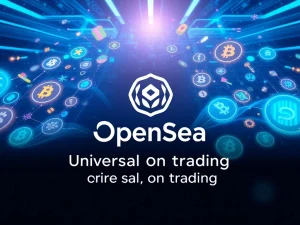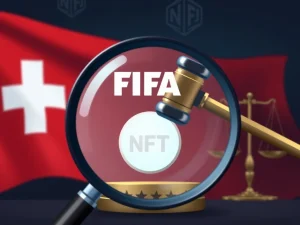Dramatic Pivot: Pixel Vault, the NFT Platform, Seeks Acquisition After $100M Funding
The world of Web3 is no stranger to dramatic shifts, but the recent announcement from Pixel Vault has sent ripples through the NFT community. Once a beacon of innovation in the digital collectibles space, the company, known for pioneering projects like PUNKS Comic and the MetaHero Universe, is now preparing to cease operations. This pivotal moment underscores the inherent volatility and evolving landscape of the crypto sector, prompting questions about the sustainability of even well-funded ventures.
The Meteoric Rise and Unexpected Fall of Pixel Vault
In February 2022, Pixel Vault made headlines by securing a staggering $100 million in funding from prominent investors like Velvet Sea Ventures and 01A. The ambition was grand: to build a multi-franchise NFT platform that would serve as a hub for creators and collectors, transforming how digital content was consumed and owned. For over four years, the team dedicated itself to this vision, striving to forge a “profitable and sustainable crypto entertainment company.”
However, despite this significant investment and fervent effort, the company recently admitted that the venture “did not go as planned.” This candid admission highlights a stark reality: even substantial capital infusions don’t guarantee success in the rapidly shifting Web3 landscape. The dream of a sprawling digital entertainment empire, built on the back of NFTs, has encountered unforeseen hurdles, leading to the difficult decision to wind down independent operations.
Navigating Challenges as an NFT Platform
The journey of any NFT platform is fraught with unique challenges. While the initial boom saw unprecedented growth and speculative fervor, the subsequent market corrections and evolving consumer sentiment have tested the resilience of many projects. For Pixel Vault, the aspiration to balance innovation with profitability proved to be a complex equation.
Key challenges faced by NFT platforms often include:
- Market Volatility: The crypto market is notoriously unpredictable, with rapid price swings impacting asset values and investor confidence.
- Evolving Consumer Demand: User interest in specific NFT projects can wane quickly, requiring constant innovation and adaptation.
- Monetization Difficulties: Beyond initial sales, establishing sustainable revenue models for NFT-based content and experiences remains a hurdle.
- Scalability and User Experience: Building robust, user-friendly platforms that can handle high transaction volumes and diverse user needs is technically demanding.
Pixel Vault’s experience serves as a powerful case study, demonstrating that even with a strong community and notable intellectual property, long-term viability requires more than just initial hype and funding.
The Shifting Sands of Crypto Entertainment
The broader crypto entertainment sector is undergoing a period of intense re-evaluation. What began with grand visions of decentralized media empires and play-to-earn gaming has matured into a more nuanced understanding of the economic realities. Pixel Vault’s pivot reflects this industry-wide recalibration, where companies are increasingly prioritizing strategic partnerships and consolidation to remain competitive.
The company is actively seeking acquisition offers, entering discussions with multiple institutional buyers. Notably, they are in direct communication with Seedphrase regarding the handover of their popular Wolf Game initiative. This strategic move aims to ensure the continuity of their assets and community, even as the core company prepares for cessation. This trend of consolidation is not isolated to Pixel Vault; we’ve seen similar movements across the digital asset industries:
| Company/Entity | Action/Outcome | Implication |
|---|---|---|
| Pixel Vault | Seeking acquisition, winding down | Challenges in sustaining independent growth in crypto entertainment. |
| Polygon | Acquisition by Valnet (as an example of industry consolidation) | Larger entities absorbing smaller, innovative projects for market share. |
| Niantic | Reported transfer of operations to a Saudi-based entity | Restructuring to adapt to market pressures and leverage new resources. |
These instances highlight a growing recognition that in a market dominated by larger players and evolving regulatory landscapes, strategic alliances and acquisitions can be crucial for survival and growth.
Crucial Lessons for Every Web3 Startup
The journey of Pixel Vault offers invaluable insights for every aspiring Web3 startup. While innovation and groundbreaking ideas are essential, sustainable growth hinges on a robust business model that can withstand market fluctuations and deliver tangible value beyond speculative appeal. The initial optimism that fueled the 2022 funding round has given way to a sobering reminder of the risks associated with over-reliance on speculative markets.
Key takeaways for Web3 startups:
- Focus on Profitability: From day one, build a clear path to generating sustainable revenue, rather than solely relying on funding rounds or token appreciation.
- Adaptability is Key: The Web3 space is dynamic. Be prepared to pivot, restructure, and innovate rapidly in response to market changes and user feedback.
- Community Engagement: While Pixel Vault had a strong community, ensuring long-term engagement and value for users is critical, even during difficult transitions.
- Diversify Revenue Streams: Explore multiple avenues for monetization beyond primary sales of digital assets.
- Realistic Projections: Avoid inflated valuations and focus on achievable milestones and growth targets.
The challenges faced by Pixel Vault underscore the importance of balancing ambitious vision with practical execution and a keen understanding of market dynamics.
The Future of Assets: What a Blockchain Acquisition Entails
The potential blockchain acquisition of Pixel Vault’s assets, including its intellectual property and community-driven projects, presents a complex yet fascinating scenario. For buyers, this could be an opportunity to expand their NFT portfolios and integrate established brands into their ecosystems. For the community, the transition of projects like Wolf Game to Seedphrase, a crypto wallet provider, may offer a degree of continuity, but the broader implications for the NFT ecosystem remain to be seen.
An acquisition in the blockchain space is often more intricate than traditional mergers, involving:
- Digital Asset Transfer: Secure and verifiable transfer of NFTs, tokens, and other on-chain assets.
- Intellectual Property Rights: Clear transfer of IP for art, narratives, and game mechanics.
- Community Management: Strategies for retaining and integrating existing communities into the new entity.
- Technological Integration: Merging or migrating existing blockchain infrastructure and smart contracts.
Stakeholders in the crypto space will undoubtedly monitor this case closely. The outcome could serve as a barometer of investor confidence in NFT platforms and influence future strategies for startups navigating the intersection of blockchain technology and entertainment. It’s a powerful reminder that in the digital asset sector, adaptability and strategic foresight often determine survival.
Conclusion
The announcement of Pixel Vault preparing to cease independent operations and seek acquisition is a significant moment for the NFT and broader Web3 industries. It highlights the immense challenges of building sustainable businesses in a volatile and rapidly evolving market, even with substantial funding. While the initial vision for a comprehensive crypto entertainment platform was ambitious, the realities of market conditions and profitability proved formidable. This dramatic pivot underscores a growing trend of consolidation and strategic restructuring within the digital asset space, offering crucial lessons for every aspiring Web3 startup. As the industry watches for a potential blockchain acquisition, Pixel Vault’s journey serves as a compelling reminder that in the world of decentralized innovation, resilience, adaptability, and a clear path to profitability are paramount for long-term success.
Frequently Asked Questions (FAQs)
Q1: Why is Pixel Vault shutting down despite raising $100 million?
A1: Pixel Vault stated that their efforts to build a “profitable and sustainable crypto entertainment company” did not go as planned. Despite significant funding, challenges such as market volatility, evolving consumer demand, and difficulties in monetizing NFT-based content likely contributed to their decision to wind down operations and seek an acquisition.
Q2: What will happen to Pixel Vault’s NFT projects like PUNKS Comic and MetaHero Universe?
A2: Pixel Vault is actively seeking acquisition offers to transition its business and assets. This suggests that their intellectual property, including projects like PUNKS Comic and MetaHero Universe, would be part of a potential acquisition, ideally ensuring their continuity under new ownership. The Wolf Game initiative is specifically being handed over to Seedphrase.
Q3: What does Pixel Vault’s situation mean for the broader NFT and crypto entertainment industry?
A3: Pixel Vault’s case highlights the difficulties faced by companies attempting to balance innovation with profitability in a rapidly shifting digital asset landscape. It underscores a trend of consolidation in the industry, where strategic partnerships and acquisitions are becoming more common as companies adapt to market pressures and seek long-term viability.
Q4: What lessons can other Web3 startups learn from Pixel Vault’s experience?
A4: Web3 startups can learn the importance of focusing on profitability from day one, building adaptable business models, fostering strong community engagement, diversifying revenue streams, and setting realistic projections. The case emphasizes that substantial funding alone doesn’t guarantee success without a clear path to sustainable growth amidst market volatility.
Q5: What is a “blockchain acquisition” and how does it differ from traditional acquisitions?
A5: A blockchain acquisition involves the transfer of digital assets, intellectual property, and community management related to blockchain-based projects. It differs from traditional acquisitions by often including the secure and verifiable transfer of on-chain assets (NFTs, tokens), integrating existing blockchain infrastructure, and managing decentralized communities, adding layers of technical and community-related complexity.








